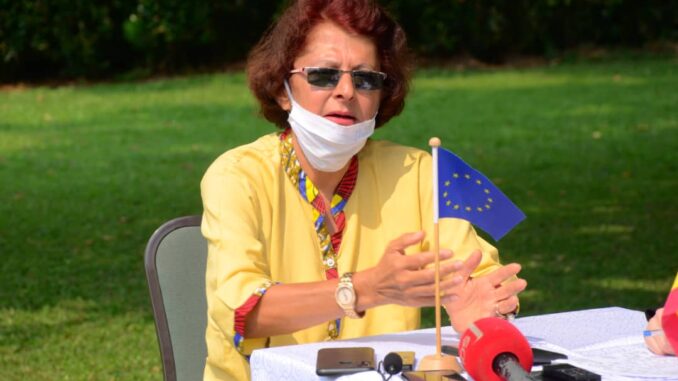
As a digital democracy campaigner, I believe African governments must use digital technology to be more open about their activities. Transparency through technology is the most effective way of tackling corruption and building public confidence in our political institutions.
But having government officials film themselves plotting to pocket coronavirus relief funds and then putting the recordings on the internet is taking things too far, even for me.
But that’s what Ugandan government officials appear to have done this past week.
Uganda just recalled its ambassador to Denmark after she and her deputy appeared to be filmed plotting to carve up government cash meant to help with the COVID-19 crisis.
Catching crooks with secret cameras is nothing new, but these recordings were made by the alleged conspirators themselves, who due to COVID-19 social distancing and travel restrictions had to meet using Zoom video conferencing.
Ambassador Nimisha Madhvani and her staff were allegedly heard plotting to share out money meant to help Ugandan citizens stranded overseas, including bribing any auditors uncovering “jumbled funds” at the mission.
“Give yourselves $4000” one official seems to instruct staff.
Clips from the meeting are now being shared widely on social media. The head of Uganda’s foreign ministry has pledged a full investigation and stated “the ministry wishes to express grave concern about the allegations … and takes this matter seriously”.
There is an important lesson for governments here. There is no hiding place for crooked officials in the digital age – so embrace the benefits of being transparent.
Stories like this will be familiar to many Nigerians. Just this past week, one newspaper reported that the case files of 15 high profile individuals facing graft and other criminal charges have “disappeared” and a former petroleum minister is under investigation of corruption offences in the UK.
I often think back to a report from the Global Integrity Index which reported that when it comes to aid, many African governments are “adept at engineering laws and institutions to meet foreign donor requirements despite their failure to deliver for ordinary citizens”.
This is what the international community thinks of us. But our own communities have even worse opinions of our democratic institutions. One study reported 72% of Nigerians believe the statement “most politicians are corrupt” describes our country well – and six-in-ten said it described Nigeria “very well.”
Another survey reported that almost half of Nigerians believe corruption cannot be defeated.
This needs to change. Which is why the digital democracy campaign I lead is creating technology to increase political transparency and accountability and making it freely available to all Nigerians.
Our free Rate Your Leader app lets confirmed voters ask direct questions to their local elected leaders and allows them to rate the answers they receive for their neighbours to see.
The app also helps politicians engage directly with the people who elected them, building relationships of trust with the electorate.
But it should not be left to enlightened politicians and organisations such as Rate Your Leader to take such actions. We need a co-ordinated national response.
People often talk of not wanting to air their dirty laundry in public, but my solution to that is not to dirty your laundry in the first place!
If you have nothing to hide, you have nothing to fear – and everything to gain. And even if governments make mistakes – and everyone makes mistakes! – not only is sunlight always the best disinfectant, voters respect leaders who take responsibility when things do not go to plan.
The good news is Nigeria – whilst still estimated to have lost $400 billion to corruption since independence – has been at the forefront of digitalizing its coronavirus relief payments. Not only do digital payments get the money to the people who need it faster, the payments also leave a secure electronic paper trail proving that the money ended up in the right hands.
There has also been increasing publication of government borrowing, spending and procurement decisions on the Treasury website.
It is important that Nigeria continues with this direction of travel.
Recently, President Buhari listed building “a system to fight corruption (and) improve governance” as one of his administration’s priorities for the next three years.
The digital publication of government records, made easily accessible and comprehensible to all Nigerians using smartphones, will be key to delivering on that priority.
Joel Popoola is a Nigerian tech entrepreneur and digital democracy campaigner, as well as the creator of the Rate Your Leader app. You can reach Joel on Twitter @JOPopoola
END

Be the first to comment